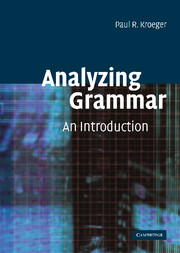Book contents
- Frontmatter
- Contents
- Preface and acknowledgments
- List of abbreviations
- 1 Grammatical form
- 2 Analyzing word structure
- 3 Constituent structure
- 4 Semantic roles and Grammatical Relations
- 5 Lexical entries and well-formed clauses
- 6 Noun Phrases
- 7 Case and agreement
- 8 Noun classes and pronouns
- 9 Tense, Aspect, and Modality
- 10 Non-verbal predicates
- 11 Special sentence types
- 12 Subordinate clauses
- 13 Derivational morphology
- 14 Valence-changing morphology
- 15 Allomorphy
- 16 Non-linear morphology
- 17 Clitics
- Appendix: Swahili data for grammar sketch
- Glossary
- Reference
- Language index
- Subject index
8 - Noun classes and pronouns
Published online by Cambridge University Press: 05 June 2012
- Frontmatter
- Contents
- Preface and acknowledgments
- List of abbreviations
- 1 Grammatical form
- 2 Analyzing word structure
- 3 Constituent structure
- 4 Semantic roles and Grammatical Relations
- 5 Lexical entries and well-formed clauses
- 6 Noun Phrases
- 7 Case and agreement
- 8 Noun classes and pronouns
- 9 Tense, Aspect, and Modality
- 10 Non-verbal predicates
- 11 Special sentence types
- 12 Subordinate clauses
- 13 Derivational morphology
- 14 Valence-changing morphology
- 15 Allomorphy
- 16 Non-linear morphology
- 17 Clitics
- Appendix: Swahili data for grammar sketch
- Glossary
- Reference
- Language index
- Subject index
Summary
In this chapter we discuss two topics relating to the syntax, morphology and semantics of nouns and noun phrases. In the first section we will look at ways in which the nouns in a particular language may be sub-classified on the basis of grammatical markers. In the second section we will look at pronouns and pronoun systems.
Noun classes and gender
In the preceding chapter we made several references to the “gender” of a noun. The term gender has a very specific meaning in linguistics. Essentially, a gender system is a partitioning of the category N which has morphological consequences of a particular kind. In languages that have grammatical gender, each noun of the language is assigned to one of a small, fixed set of sub-classes, and the sub-class of each noun is reflected in some type of agreement morphology. In chapter 7 we saw examples of determiners and adjectives agreeing with the gender of their head noun in Portuguese (33), and of Russian past tense verbs agreeing with the gender of singular subjects (25).
Another common strategy for marking the sub-class of a noun is through the use of noun classifiers. Classifiers are separate words that occur inside the NP in certain contexts (e.g. when the NP also contains a numeral or quantifier) and serve to indicate the sub-class of the head noun. We will discuss each of these strategies in turn. Then in section 8.1.3 we will summarize the crucial differences between gender and classifier systems.
- Type
- Chapter
- Information
- Analyzing GrammarAn Introduction, pp. 128 - 146Publisher: Cambridge University PressPrint publication year: 2005



